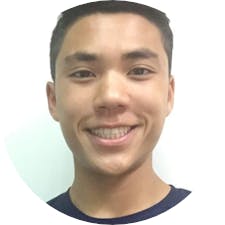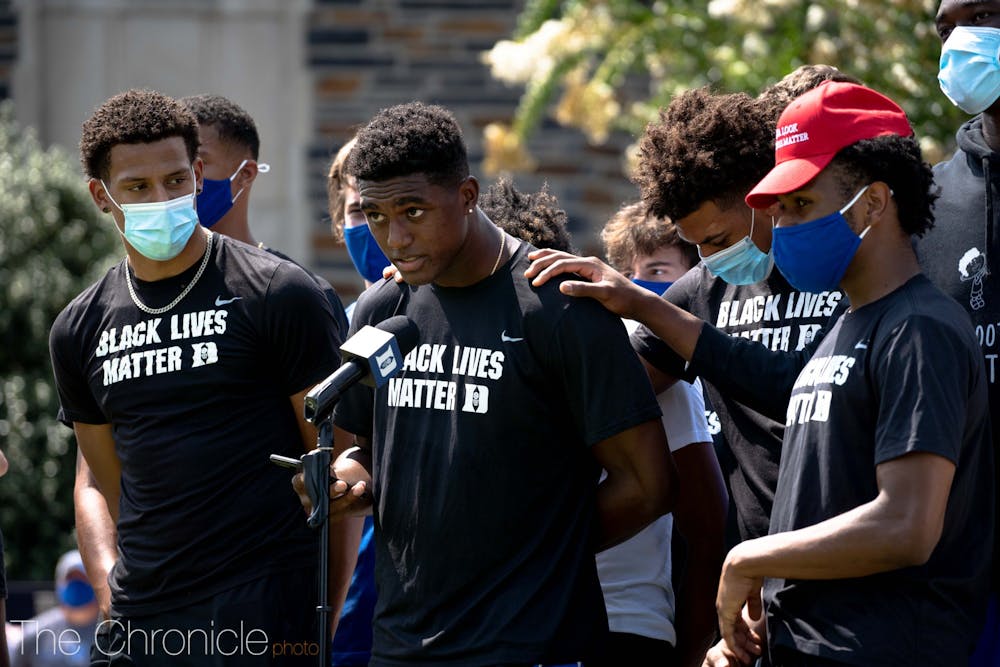First-year Henry Coleman III, a member of the men’s basketball team, stood on a small platform.
“Last night, I wrote this out of pain, out of anger,” Coleman said, pulling out his phone to read.
“This country has had its knee on the neck of African Americans for too long.”
Halfway through his speech, Coleman’s teammates streamed onto the platform and huddled around him, their hands gripping him and each other.
“This country has put a dagger in our backs,” he continued. “And it’s yet to even acknowledge the dagger, let alone try to pull it out.”
Coleman’s speech was one of several during a Black Lives Matter protest that took place at Krzyzewskiville on a sweltering afternoon Thursday, days after the Sunday shooting of Jacob Blake in Kenosha, Wis. reopened the wounds of police violence and racial justice in America. Protests erupted in Kenosha. The NBA postponed three of its playoff games after the Milwaukee Bucks chose not to play on Wednesday, and many other sports leagues followed suit.
The protest at K-Ville was led by Nolan Smith, Duke men’s basketball's director of operations. More than 100 people stood on the grass, where white splotches of paint marked spots six feet apart. Many of the protesters wore black clothing and clutched cardboard signs: “Love Black Lives like you love Black culture” and “Tolerating racism is racism.”
Student-athletes and athletic staff made up a significant number of those present, including the men’s basketball team, who stood directly behind a small, fenced-off platform and podium.
On the platform, several speakers delivered their remarks, including Smith, Coleman, men’s basketball head coach Mike Krzyzewski, women’s basketball head coach Kara Lawson and senior Michael Buckmire.
“Today is for all of us to acknowledge this problem, to share our feelings,” Krzyzewski said. “This is a time for us to be all on the same team.”
He called the audience to take concrete action by registering to vote, noting that tables had been set up outside Cameron Indoor Stadium for both basketball teams to register.
“We can see the police brutality but what you don't see are the amount of educational opportunities that are deprived young Black kids, health and welfare opportunities, economic opportunities,” Krzyzewski said. “These things can only be changed with proper leadership and organization. The first step in that is for all of us to vote.”
This generation is the one that can truly bring about change—the generation that can finally win—he said.
“I grew up a long time ago in the [1960s]. I thought it was heading in the right direction. Damn, I was wrong,” he said. “I want to be right. I want to be on your team. And I want this systemic racism and social injustice to be defeated.”
Buckmire stood on the platform and held up a sign that read, “Am I next?” as he gave a speech.
“There’s this idea of survivor’s guilt of other Black men seeing other Black men being killed. Am I next? Why is it this person? What’s going to happen if it’s me next? It’s something that’s scary and it’s something I can’t explain,” Buckmire said.
Lawson took the floor next.
“I wanted to give a little insight into what it's like to be an African American in this country,” she said.
Lawson paused for a while and continued with a strained voice.
“Every day, when you wake up, you feel anxious every minute, knowing that on your drive to school, or your drive to work, going to a restaurant, sitting in your house, hanging out with friends at a bar, that could be your last moment on Earth.”
Get The Chronicle straight to your inbox
Sign up for our weekly newsletter. Cancel at any time.
She also emphasized the uphill nature of this battle.
“It takes a lot of endurance. You have to be prepared to endure,” she said. “It's something that being born African American is built into us. We know how to endure. We've had to do it every minute of every day.”
Coleman was the final speaker of the event. He led the crowd in a chant.
“We will demand change,” he said. The protesters murmured back.
“Wasn’t loud enough,” he said. This time, the crowd rumbled in response.
“We will demand change. We will demand justice. We will gain equality. And we will be great,” the group shouted.
First-year Ashley Sha held a sign with a quote from Malcom X: “A man who stands for nothing will fall for anything.” She said Coleman’s emotional speech was particularly impactful for her. “Just him speaking and showing his emotions,” she said.
This was Sha’s first protest, but she said she plans to continue attending protests in the future and donating to Black Lives Matter causes.
Wearing a black shirt and a pink mask, Ade Owokoniran, a junior on the volleyball team, said events like these have a “major impact.”
“It reinforces our own thoughts as student-athletes that we’re not alone, but it’s also a starting ground for the future,” she said. “We could have more events like this in the future that are going to be even bigger, even more impactful, reach more voices, reach more of the community.”
Sports, she said, have always been a vehicle for change.
“People watch sports because they’re going to be entertained by the athletes and the people participating in sports know that it’s more than that. It’s our livelihood, but it’s also bigger than that… People who play sports can really change the world.”
Sophomore Nii Engmann wore a black shirt that had “Black-nificent” emblazoned in white. He said he felt inspired by the number and variety of people who showed up.
“It wasn’t just athletes—professors, trainers, regular students, people from all different walks of life, who showed up to show their support. And just being there, not even necessarily speaking, but their presence there I think speaks louder than any speech that any single person could have given,” he said.
First-year Isaiah Hamilton heard about the event through social media.
“What really resonated with me was just getting our asses in there and voting,” he said. “Because I believe this goes beyond today. This is beyond every single day. It’s a bigger process. It’s not a moment. It’s a movement.”

Chris Kuo is a Trinity senior and a staff reporter for The Chronicle's 118th volume. He was previously enterprise editor for Volume 117.

